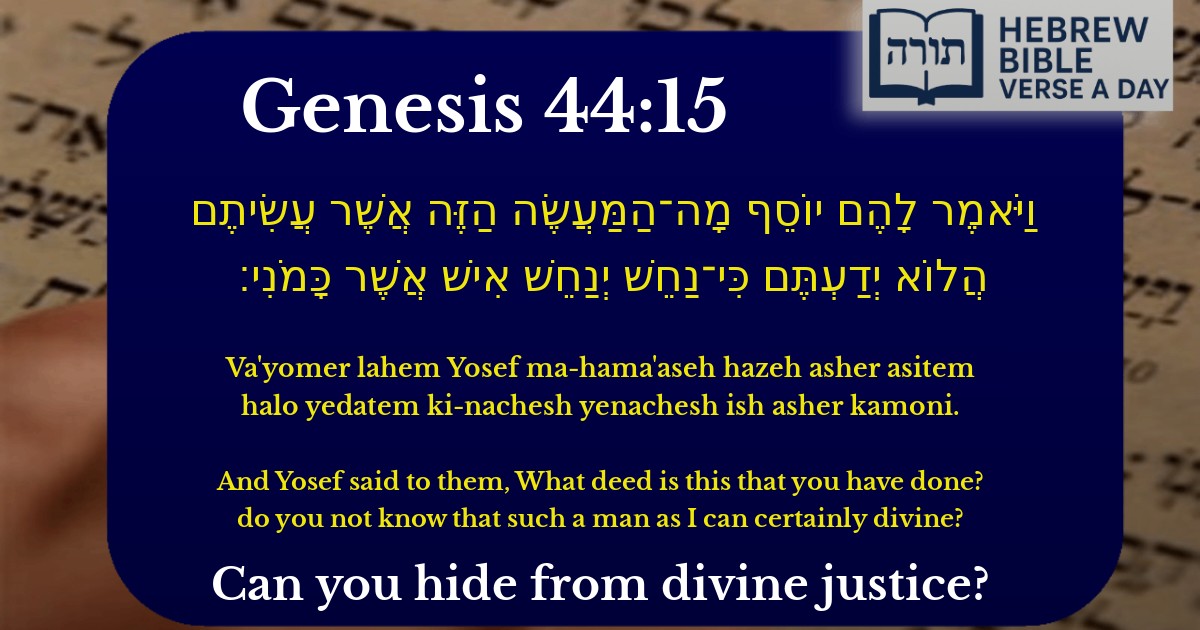Join Our Newsletter To Be Informed When New Videos Are Posted
Join the thousands of fellow Studends who rely on our videos to learn how to read the bible in Hebrew for free!
Hebrew Text
וַיֹּאמֶר לָהֶם יוֹסֵף מָה־הַמַּעֲשֶׂה הַזֶּה אֲשֶׁר עֲשִׂיתֶם הֲלוֹא יְדַעְתֶּם כִּי־נַחֵשׁ יְנַחֵשׁ אִישׁ אֲשֶׁר כָּמֹנִי׃
English Translation
And Yosef said to them, What deed is this that you have done? do you not know that such a man as I can certainly divine?
Transliteration
Va'yomer lahem Yosef ma-hama'aseh hazeh asher asitem halo yedatem ki-nachesh yenachesh ish asher kamoni.
Hebrew Leining Text
וַיֹּ֤אמֶר לָהֶם֙ יוֹסֵ֔ף מָֽה־הַמַּעֲשֶׂ֥ה הַזֶּ֖ה אֲשֶׁ֣ר עֲשִׂיתֶ֑ם הֲל֣וֹא יְדַעְתֶּ֔ם כִּֽי־נַחֵ֧שׁ יְנַחֵ֛שׁ אִ֖ישׁ אֲשֶׁ֥ר כָּמֹֽנִי׃
וַיֹּ֤אמֶר לָהֶם֙ יוֹסֵ֔ף מָֽה־הַמַּעֲשֶׂ֥ה הַזֶּ֖ה אֲשֶׁ֣ר עֲשִׂיתֶ֑ם הֲל֣וֹא יְדַעְתֶּ֔ם כִּֽי־נַחֵ֧שׁ יְנַחֵ֛שׁ אִ֖ישׁ אֲשֶׁ֥ר כָּמֹֽנִי׃
🎵 Listen to leining
Parasha Commentary
📚 Talmud Citations
This verse is not quoted in the Talmud.


Yosef's Rebuke and the Concept of Divination
The verse (Bereshit 44:15) records Yosef's confrontation with his brothers after the discovery of the goblet in Binyamin's sack. Yosef exclaims, "What deed is this that you have done? Do you not know that such a man as I can certainly divine?" Rashi explains that Yosef was subtly hinting to his brothers that they should have known he had special insight, as he had accurately identified them earlier (when they first came to Egypt). This aligns with Yosef's earlier dream interpretation abilities (Bereshit 40-41).
The Nature of Yosef's "Divination"
The term "נַחֵשׁ יְנַחֵשׁ" (can certainly divine) raises questions about the permissibility of divination according to Halacha. Rambam (Hilchot Avodat Kochavim 11:4) prohibits various forms of divination, but Yosef's statement must be understood differently:
Moral Lesson in Yosef's Words
The Midrash (Bereshit Rabbah 92:8) highlights that Yosef's rebuke echoes the brothers' earlier words to Yaakov ("Do you not know..." - Bereshit 37:10), showing measure-for-measure justice. The Talmud (Chullin 89b) also derives from this verse that leaders should sometimes employ indirect communication (like Yosef's rhetorical question) to prompt introspection.
Historical Context of Divination in Egypt
Ibn Ezra observes that Yosef adopted terminology familiar to Egyptians (who heavily practiced divination) to make his claim believable. This aligns with the principle of "דיברה תורה בלשון בני אדם" (the Torah speaks in human terms), where Yosef used culturally relevant language without endorsing its practices.